[精品]专业英语翻译练习5:纳米技术.doc
科普作文 纳米技术英语
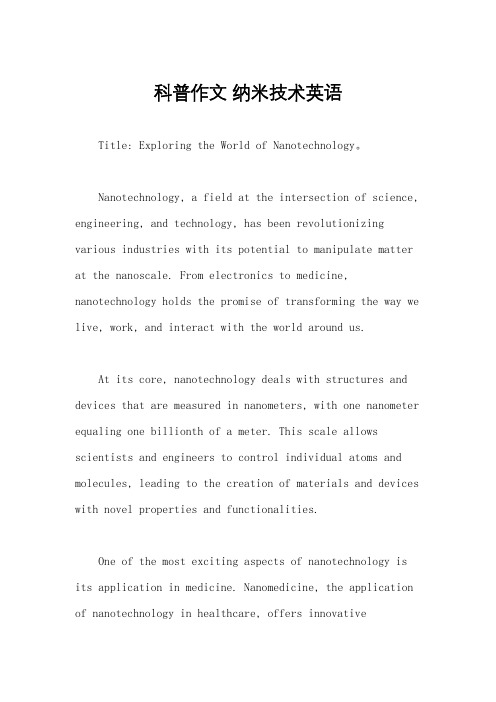
科普作文纳米技术英语Title: Exploring the World of Nanotechnology。
Nanotechnology, a field at the intersection of science, engineering, and technology, has been revolutionizing various industries with its potential to manipulate matter at the nanoscale. From electronics to medicine, nanotechnology holds the promise of transforming the way we live, work, and interact with the world around us.At its core, nanotechnology deals with structures and devices that are measured in nanometers, with one nanometer equaling one billionth of a meter. This scale allows scientists and engineers to control individual atoms and molecules, leading to the creation of materials and devices with novel properties and functionalities.One of the most exciting aspects of nanotechnology is its application in medicine. Nanomedicine, the application of nanotechnology in healthcare, offers innovativesolutions for diagnosis, treatment, and monitoring of diseases. For instance, nanoparticles can be engineered to target specific cells or tissues in the body, delivering drugs directly to the site of action while minimizing side effects. Additionally, nanosensors can be used for early detection of diseases, providing clinicians with valuable insights into a patient's health status.In the field of electronics, nanotechnology has led to the development of smaller, faster, and more efficient devices. By miniaturizing electronic components to the nanoscale, researchers have been able to increase the performance of computers, smartphones, and other electronic gadgets. Moreover, nanomaterials such as graphene and carbon nanotubes hold promise for the next generation of electronics, offering superior conductivity and mechanical properties.Another area where nanotechnology is making significant strides is in environmental remediation and renewable energy. Nanomaterials can be used to purify water by removing contaminants and pollutants, providing asustainable solution to water scarcity and pollution. Additionally, nanoscale catalysts are being developed for more efficient energy conversion processes, such as fuel cells and solar cells, paving the way for a greener and more sustainable future.Despite its promising applications, nanotechnology also raises concerns about potential risks to human health and the environment. As nanoparticles become more prevalent in consumer products and industrial processes, it is essential to understand their potential impact and implement appropriate safety measures. Researchers are actively studying the toxicity of nanoparticles and developing strategies to minimize their adverse effects.In conclusion, nanotechnology holds immense potential to revolutionize various aspects of our lives, from healthcare and electronics to environmental sustainability. By harnessing the unique properties of materials at the nanoscale, scientists and engineers can create innovative solutions to some of the most pressing challenges facing humanity. However, it is crucial to proceed with cautionand address the ethical, safety, and regulatory implications of nanotechnology to ensure its responsible and beneficial implementation.。
纳米技术

记者: 记者: 纳米技术的前景几乎是无限广阔的,这就是为什么政府在支持它, 纳米技术的前景几乎是无限广阔的,这就是为什么政府在支持它, 而批评者害怕它有副作用。国际电视新闻,劳伦斯迈根提报道。 而批评者害怕它有副作用。国际电视新闻,劳伦斯迈根提报道。
Nano trousers are just on application of the technology. This is a nano factory producing almost any material you want as very fine nano powders. 记者: 记者: 如果你认为纳米技术都是未来的事情,那就再想想。例如, 如果你认为纳米技术都是未来的事情,那就再想想。例如,这是纳 米裤子;它们已经在美国出售。它摸上去就像普通棉布裤子一样, 米裤子;它们已经在美国出售。它摸上去就像普通棉布裤子一样, 但是里面有一个薄薄的纳米层,它能防止液体弄湿或弄脏裤子。 但是里面有一个薄薄的纳米层,它能防止液体弄湿或弄脏裤子。所 如果你把饮料弄洒了,就会出现这样的情况,它只是往下流, 以,如果你把饮料弄洒了,就会出现这样的情况,它只是往下流, 裤子甚至都不会显。 裤子甚至都不会显。 纳米裤子只是这种技术的一个应用实例。这是一家纳米工厂, 纳米裤子只是这种技术的一个应用实例。这是一家纳米工厂,它几 乎能利用细小的纳米粉生产你想要的任何东西。 乎能利用细小的纳米粉生产你想要的任何东西。 Paul Rei, Qinetiq nanomaterials that’s There are 50,000 particles in this vial for every person on the planet, that s all 6.9 billion people.
text-8-how-nanotechnology-works
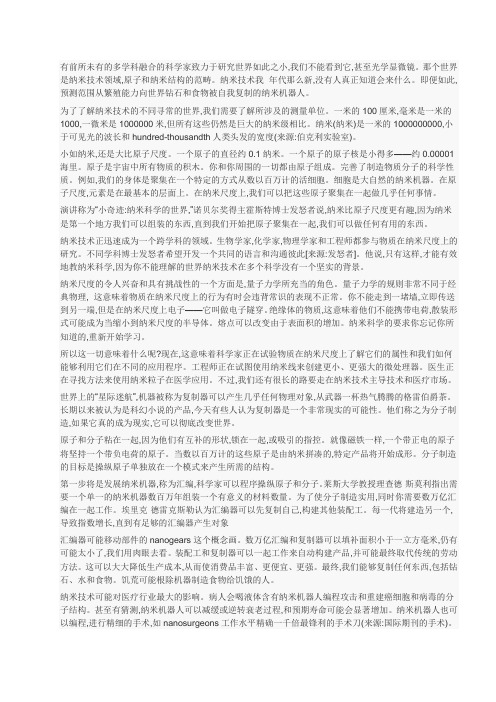
有前所未有的多学科融合的科学家致力于研究世界如此之小,我们不能看到它,甚至光学显微镜。
那个世界是纳米技术领域,原子和纳米结构的范畴。
纳米技术我¬年代那么新,没有人真正知道会来什么。
即便如此,预测范围从繁殖能力向世界钻石和食物被自我复制的纳米机器人。
为了了解纳米技术的不同寻常的世界,我们需要了解所涉及的测量单位。
一米的100厘米,毫米是一米的1000,一微米是1000000米,但所有这些仍然是巨大的纳米级相比。
纳米(纳米)是一米的1000000000,小于可见光的波长和hundred-thousandth人类头发的宽度(来源:伯克利实验室)。
小如纳米,还是大比原子尺度。
一个原子的直径约0.1纳米。
一个原子的原子核是小得多——约0.00001海里。
原子是宇宙中所有物质的积木。
你和你周围的一切都由原子组成。
完善了制造物质分子的科学性质。
例如,我们的身体是聚集在一个特定的方式从数以百万计的活细胞。
细胞是大自然的纳米机器。
在原子尺度,元素是在最基本的层面上。
在纳米尺度上,我们可以把这些原子聚集在一起做几乎任何事情。
演讲称为“小奇迹:纳米科学的世界,”诺贝尔奖得主霍斯特博士发怒者说,纳米比原子尺度更有趣,因为纳米是第一个地方我们可以组装的东西,直到我们开始把原子聚集在一起,我们可以做任何有用的东西。
纳米技术正迅速成为一个跨学科的领域。
生物学家,化学家,物理学家和工程师都参与物质在纳米尺度上的研究。
不同学科博士发怒者希望开发一个共同的语言和沟通彼此[来源:发怒者]。
他说,只有这样,才能有效地教纳米科学,因为你不能理解的世界纳米技术在多个科学没有一个坚实的背景。
纳米尺度的令人兴奋和具有挑战性的一个方面是,量子力学所充当的角色。
量子力学的规则非常不同于经典物理,¬这意味着物质在纳米尺度上的行为有时会违背常识的表现不正常。
你不能走到一堵墙,立即传送到另一端,但是在纳米尺度上电子——它叫做电子隧穿。
Nanotechnology (原文)
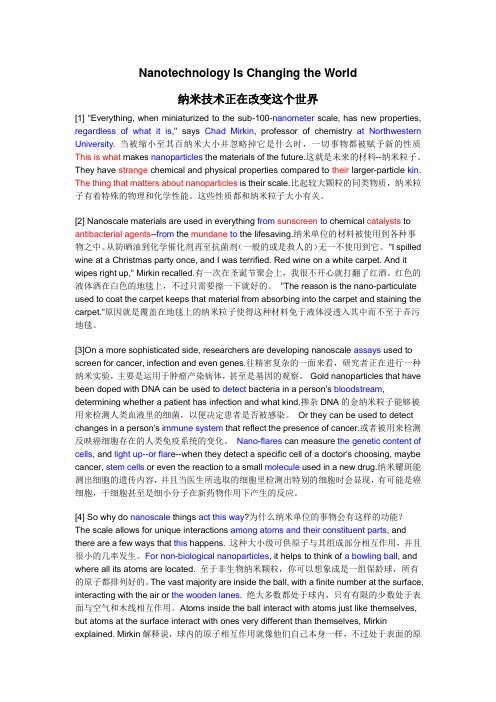
Nanotechnology Is Changing the World纳米技术正在改变这个世界[1] "Everything, when miniaturized to the sub-100-nanometer scale, has new properties, regardless of what it is," says Chad Mirkin, professor of chemistry at Northwestern University. 当被缩小至其百纳米大小并忽略掉它是什么时,一切事物都被赋予新的性质This is what makes nanoparticles the materials of the future.这就是未来的材料--纳米粒子。
They have strange chemical and physical properties compared to their larger-particle kin. The thing that matters about nanoparticles is their scale.比起较大颗粒的同类物质,纳米粒子有着特殊的物理和化学性能。
这些性质都和纳米粒子大小有关。
[2] Nanoscale materials are used in everything from sunscreen to chemical catalysts to antibacterial agents--from the mundane to the lifesaving.纳米单位的材料被使用到各种事物之中。
从防晒油到化学催化剂再至抗菌剂(一般的或是救人的)无一不使用到它。
"I spilled wine at a Christmas party once, and I was terrified. Red wine on a white carpet. And it wipes right up," Mirkin recalled.有一次在圣诞节聚会上,我很不开心就打翻了红酒。
纳米技术的练习里面有个小作文
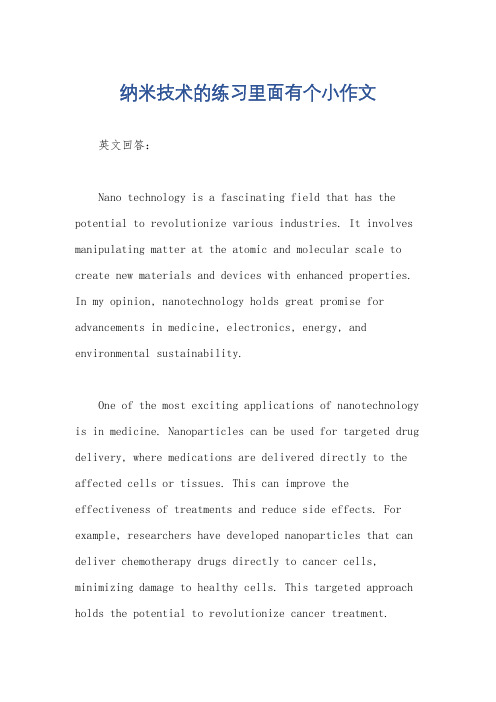
纳米技术的练习里面有个小作文英文回答:Nano technology is a fascinating field that has the potential to revolutionize various industries. It involves manipulating matter at the atomic and molecular scale to create new materials and devices with enhanced properties. In my opinion, nanotechnology holds great promise for advancements in medicine, electronics, energy, and environmental sustainability.One of the most exciting applications of nanotechnology is in medicine. Nanoparticles can be used for targeted drug delivery, where medications are delivered directly to the affected cells or tissues. This can improve the effectiveness of treatments and reduce side effects. For example, researchers have developed nanoparticles that can deliver chemotherapy drugs directly to cancer cells, minimizing damage to healthy cells. This targeted approach holds the potential to revolutionize cancer treatment.Another area where nanotechnology is making a significant impact is in electronics. By using nanoscale materials, researchers are able to develop smaller, faster, and more efficient electronic devices. For instance, nanoscale transistors have enabled the development of smaller and more powerful computer chips, leading to advancements in computing power and storage capacity. Additionally, nanotechnology is being used to develop flexible and transparent displays, which can be used in wearable devices and flexible electronics.Nanotechnology also has the potential to revolutionize the energy sector. Researchers are exploring the use of nanomaterials in solar cells to improve their efficiency and reduce costs. By incorporating nanomaterials, such as quantum dots, into solar panels, they can capture a broader spectrum of sunlight and convert it into electricity more efficiently. This could lead to widespread adoption of solar energy as a clean and renewable source of power.Furthermore, nanotechnology can play a crucial role inaddressing environmental challenges. For example, nanomaterials can be used to develop more efficientcatalysts for chemical reactions, reducing the energy consumption and waste production in industrial processes. Additionally, nanotechnology can be used to develop sensors for detecting and monitoring pollutants in air and water. These sensors can provide real-time data, enabling prompt action to mitigate environmental pollution.中文回答:纳米技术是一个令人着迷的领域,有潜力彻底改变各个行业。
英语科技翻译考试题及答案

英语科技翻译考试题及答案一、单选题(每题2分,共20分)1. The term "nanotechnology" refers to the technology that deals with structures on a scale of ________.A. nanometersB. millimetersC. centimetersD. meters答案:A2. In the context of artificial intelligence, "neural network" is a model inspired by ________.A. human brainB. computer algorithmsC. natural languageD. mechanical engineering答案:A3. The process of converting solar energy into electricity is known as ________.A. photosynthesisB. thermodynamicsC. solar photovoltaicsD. nuclear fusion答案:C4. Which of the following is not a characteristic of a quantum computer?A. SuperpositionB. EntanglementC. DeterministicD. Quantum tunneling答案:C5. The term "biotechnology" is often associated with the manipulation of ________.A. electronic devicesB. living organismsC. chemical compoundsD. geological formations答案:B6. In the field of robotics, "actuator" refers to a component that ________.A. senses the environmentB. processes informationC. moves or controls a mechanismD. stores energy答案:C7. "Internet of Things" (IoT) involves the interconnection of everyday objects, enabling them to send and receive data,which is based on ________.A. cloud computingB. artificial intelligenceC. machine learningD. traditional networking答案:A8. The abbreviation "AI" stands for ________.A. Artificial IntelligenceB. Artificial InputC. Advanced InterfaceD. Automated Interaction答案:A9. "Genetic engineering" involves the ________ of an organism's genes.A. removalB. additionC. modificationD. replication答案:C10. "Cybersecurity" is concerned with protecting ________.A. physical infrastructureB. digital informationC. environmental resourcesD. financial assets答案:B二、填空题(每题2分,共20分)1. The smallest unit of data in computing is called a________.答案:bit2. A ________ is a type of computer system designed to recognize, interpret, and simulate human actions.答案:robot3. In computer science, "algorithm" refers to a well-defined procedure that produces an answer to a ________.答案:problem4. The study of the behavior and interactions of dispersed phase(s) in a fluid medium is known as ________.答案:fluid mechanics5. A ________ is a device that uses light to transmit information.答案:fiber optic6. The process of converting data into a format that can be easily shared or analyzed is called ________.答案:data mining7. "Virtual reality" is a computer-generated simulation of a ________ environment.答案:three-dimensional8. The ________ is a set of rules that defines how data is formatted, transmitted, received, and processed.答案:protocol9. A ________ is a type of computer program that canreplicate itself and often spread to other computers.答案:virus10. "Machine learning" is a subset of artificial intelligence that allows computers to learn from and make decisions based on ________.答案:data三、阅读理解题(每题5分,共30分)阅读以下段落,并回答问题。
高中英语科技论文翻译练习题20题含答案解析

高中英语科技论文翻译练习题20题含答案解析1.The term “artificial intelligence” is often translated as _.A.人造智能B.人工智慧C.人工智能D.人为智能答案解析:C。
“artificial intelligence”常见的翻译是“人工智能”。
A 选项“人造智能”不太符合常见的表达习惯;B 选项“人工智慧”虽然意思接近但不是最准确的;D 选项“人为智能”不太恰当,一般不用“人为”来修饰“智能”。
2.“Nanotechnology has many applications.” can be translated as _.A.纳米技术有许多用途。
B.纳米科技有很多应用。
C.纳米技术有很多用处。
D.纳米科技有许多使用。
答案解析:B。
“applications”常见的翻译是“应用”,“nanotechnology”是“纳米科技”。
A 选项“用途”不太准确;C 选项“用处”没有“应用”更符合科技语境;D 选项“使用”也不如“应用”准确。
3“The development of robotics is rapid.” is translated as _.A.机器人的发展是快速的。
B.机器人技术的发展是迅速的。
C.机器人学的发展是快速的。
D.机器人领域的发展是迅速的。
答案解析:B。
“robotics”通常翻译为“机器人技术”。
A 选项“机器人的发展”不准确;C 选项“机器人学”不太符合这句话的整体语境;D 选项“机器人领域”也不如“机器人技术”准确。
4“Biotechnology brings great benefits.” is translated as _.A.生物科技带来巨大好处。
B.生物技术带来很大益处。
C.生物工程带来极大好处。
D.生物工艺带来很大利益。
答案解析:B。
“biotechnology”常见的翻译是“生物技术”。
A 选项“生物科技”比较宽泛;C 选项“生物工程”不太符合这句话的表达;D 选项“生物工艺”也不准确。
专业英语翻译练习5:纳米技术

What Is Nanotechnology?The shotgun marriage of chemistry and engineering called "Nanotechnology" is ushering in the era of self-replicating machinery and self-assembling consumer goods made from cheap raw atoms.Nanotechnology is molecular manufacturing or, more simply, building things one atom or molecule at a time with programmed nanoscopic robot arms. A nanometer is one billionth of a meter ( 3-4 atoms wide ). Utilizing the well understood chemical properties of atoms and molecules ( how they " stick" together) , nanotechnology proposes the construction of novel molecular devices possessing extraordinary properties. The trick is to manipulate atoms individually and place them exactly where needed to produce the desired structure. This ability is almost in our grasp. The anticipated payoff for mastering this technology is far beyond any human accomplishment so far. Technical feasibilities include:• S elf-assembling consumer goods•Computers billions of times faster• Extremely novel inventions (impossible today)• Safe and affordable space travel• Medical Nano... virtual end to illness, aging, death• No more pollution and automatic cleanup of already existing pollution• Molecular food syntheses... end of famine and starvation• Access to a superior edu cation for every child on Earth• Reintroduction of many extinct plants and animals• Terra forming here and the Solar SystemBy treating atoms as discrete, bit-like objects, molecular manufacturing will bring a digital revolution to the production of material objects. Working at the resolution limit of matter, it will enable the ultimate in miniaturization and performance. By starting with cheap, abundant tcomponents - molecules - and processing them with small, high-frequency, high-productivity machines, it will make products inexpensive. Design computers that each executes moreWhat Is Nanotechnology?The shotgun marriage of chemistry and engineering called "Nanotechnology" is ushering in the era of self-replicating machinery and self-assembling consumer goods made from cheap raw atoms.Nanotechnology is molecular manufacturing or, more simply, building things one atom or molecule at a time with programmed nanoscopic robot arms. A nanometer is one billionth of a meter ( 3-4 atoms wide' ). Utilizing the well understood chemical properties of atoms and molecules ( how they "stick" together), nanotechnology proposes the construction of novel molecular devices possessing extraordinary properties. The trick is to manipulate atoms individually and place them exactly where needed to produce the desired structure. This ability is almost in our grasp. The anticipated payoff for mastering this technology is far beyond any human accomplishment so far. Technical feasibilities include:• Self-assembling consumer goods• Computers billions of times faster• Extremely novel inventions (impossible today)• Safe and affordable space travel• Medical Nano... virtual end to illness, aging, death• No more pollution s and automatic cleanup of already existing pollution• M olecular food syntheses... end of famine and starvation• Access to a superior education for every child on Earth• Reintroduction of many extinct plants and animals• Terra forming here and the Solar SystemBy treating atoms as discrete, bit-like objects, molecular manufacturing will bring a digital revolution to the production of material objects. Working at the resolution limit of matter, it will enable the ultimate in miniaturization and performance. By starting with cheap, abundant components --molecules -- and processing them with small, high-frequency, high-productivity machines, it will make products inexpensive. Design computers that each executes more instructions per second than all of the semiconductor CPUs in the world combined. Nanotechnology will reverse the harm done by the industrial revolution. Imagine being able to cure cancer by drinking a medicine stirred into your favorite fruit juice. Imagine a supercomputer no bigger than a human cell. Imagine a four-person, surface-to-orbit spacecraft no larger or more expensive than the family car. These are just a few products expected from nanotechnology.Humanity will be faced with a powerful, accelerated social revolution as a result of nanotechnology. In the near future, a team of scientists will succeed in constructing the first nano-sized' robot capable of self-replication. Within a few short years, and five billion trillion nano-robots later, virtually all present industrial processes will be obsolete as well as our contemporary concept of labor. Consumer goods will become plentiful, inexpensive, smart, and durable. Medicine will take a quantum leap forward. Space travel and colonization will become safe and affordable.For these and other reasons, global life styles will change radically and human behavior will be drastically impacted. The world is on the brink of a new technological revolution beyond any human experience. A new, more powerful industrial revolution capable of bringing wealth, health, and education, without pollution, to every person on the planet. No longer will forest need to be cut or smoke spewed into the air. This is the promise of nanotechnology.A nanometer is one billionth of a meter. That's a thousand, million times smaller than a meter. If you blew up a baseball to the size of the earth, the atoms would become visible, about the size of grapes. Some 3-4 atoms fit lined up inside a nanometer.Nanotechnology is about building things atom by atom, molecule by molecule. The trick is to be able to manipulate atoms individually, and place them where you wish on a structure. Nature uses molecular machines to create life. If you want to see a nanotechnology machine, just look in the mirror. Scientists from several fields including chemistry, biology. physics, and electronics are driving towards the precise manipulation of matter on the atomic scale.How do we get to nanotechnology? Several approaches seem feasible. Ultimately a combination may be the key.悬索桥人们常常愿意修建悬桥以代替其他类型的桥梁,特别是在那些运输量比较小而桥的跨度又大的地方。
纳米科技英文作文带翻译
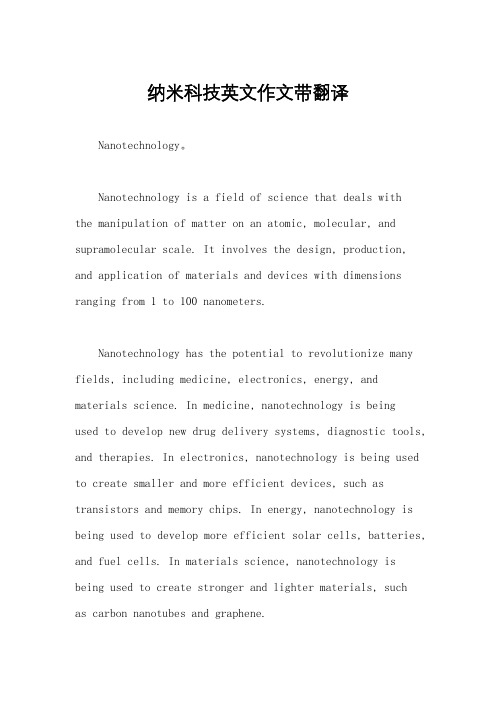
纳米科技英文作文带翻译Nanotechnology。
Nanotechnology is a field of science that deals withthe manipulation of matter on an atomic, molecular, and supramolecular scale. It involves the design, production, and application of materials and devices with dimensions ranging from 1 to 100 nanometers.Nanotechnology has the potential to revolutionize many fields, including medicine, electronics, energy, and materials science. In medicine, nanotechnology is beingused to develop new drug delivery systems, diagnostic tools, and therapies. In electronics, nanotechnology is being used to create smaller and more efficient devices, such as transistors and memory chips. In energy, nanotechnology is being used to develop more efficient solar cells, batteries, and fuel cells. In materials science, nanotechnology is being used to create stronger and lighter materials, suchas carbon nanotubes and graphene.However, nanotechnology also poses some risks and challenges. One concern is the potential toxicity of nanomaterials, which can have different properties thantheir bulk counterparts. Another concern is the possible environmental impact of nanotechnology, such as the release of nanoparticles into the air or water. Additionally, there are ethical and social issues surrounding the use of nanotechnology, such as the potential for unequal access to the benefits of nanotechnology and the possibility ofmilitary applications.Despite these challenges, nanotechnology has the potential to bring about significant advances in manyfields and improve the quality of life for people aroundthe world. As such, it is important to continue to research and develop nanotechnology in a responsible and sustainable manner.纳米科技。
高中英语科技论文翻译练习题40题

高中英语科技论文翻译练习题40题1.The term “nanotechnology” refers to the manipulation of matter on an extremely small scale.A.纳米技术B.核能技术C.网络技术D.新能源技术答案:A。
“nanotechnology”就是“纳米技术”;B 选项“核能技术”是“nuclear technology”;C 选项“网络技术”是“network technology”;D 选项“新能源技术”是“new energy technology”。
2.“Genetic engineering” is a field that involves altering the genetic makeup of organisms.A.基因工程B.地理工程C.机械工程D.软件工程答案:A。
“Genetic engineering”是“基因工程”;B 选项“地理工程”是“geographical engineering”;C 选项“机械工程”是“mechanical engineering”;D 选项“软件工程”是“software engineering”。
3.“Artificial intelligence” has the potential to revolutionize many industries.A.人工智能B.人工制造C.艺术灵感D.艺术智能答案:A。
“Artificial intelligence”是“人工智能”;B 选项“人工制造”是“artificial manufacturing”;C 选项“艺术灵感”是“artistic inspiration”;D 选项“艺术智能”不存在这个表达。
4.“Renewable energy sources” include solar power, wind power, and hydro power.A.可再生能源B.新能源C.不可再生能源D.传统能源答案:A。
nanotechnology-120纳米技术-50页精品文档
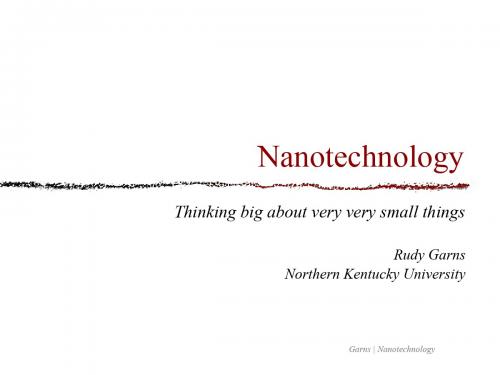
Looking at the Nanoscale
But how could we work with them?
Garns | Nanotechnology
Looking at the Nanoscale
But how could we work with them?
Clue: Our bodies/cells work with nanoscale molecules and atoms
atoms
Garns | Nanotechnology
Atoms
‣One strand of hair:
• 80,000 nm wide • 48,000,000,000,000,000,000
atoms
‣How could we see them?
Garns | Nanotechnology
Looking at the Nanoscale
Garns | Nanotechnology
Looking at the Nanoscale
Scanning Tunneling Microscope Atomic Force Microscope
Garns | Nanotechnology
Looking at the Nanoscale
Garns | Nanotechnology
• 1 light year = ~ 6 trillion miles Proxima Centauri is ~4.2 light years away
Garns | Nanotechnology
Cells and DNA
The average human body = ~10-100 trillion cells
英语作文我们身边的纳米技术
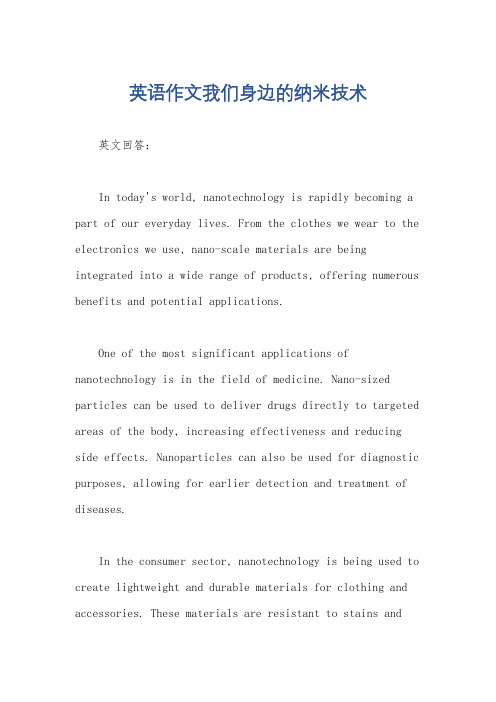
英语作文我们身边的纳米技术英文回答:In today's world, nanotechnology is rapidly becoming a part of our everyday lives. From the clothes we wear to the electronics we use, nano-scale materials are being integrated into a wide range of products, offering numerous benefits and potential applications.One of the most significant applications of nanotechnology is in the field of medicine. Nano-sized particles can be used to deliver drugs directly to targeted areas of the body, increasing effectiveness and reducing side effects. Nanoparticles can also be used for diagnostic purposes, allowing for earlier detection and treatment of diseases.In the consumer sector, nanotechnology is being used to create lightweight and durable materials for clothing and accessories. These materials are resistant to stains andwrinkles, and they can also regulate temperature, making them ideal for both hot and cold weather. Nanotechnology is also being used in the development of new types of electronics, such as flexible displays and bendable batteries.However, it is important to consider the potentialrisks and ethical implications associated with the use of nanotechnology. As nano-scale materials are so small, they can potentially enter the human body and interact with biological systems in ways that are not fully understood. It is essential to conduct thorough research and risk assessments to ensure the safe and responsible use of nanotechnology.Overall, nanotechnology has the potential to revolutionize a wide range of industries and improve our quality of life. However, it is crucial to approach its development and implementation with caution, considering both the benefits and potential risks involved.中文回答:纳米技术正在迅速成为我们日常生活的一部分。
高中英语科技论文翻译单选题40题
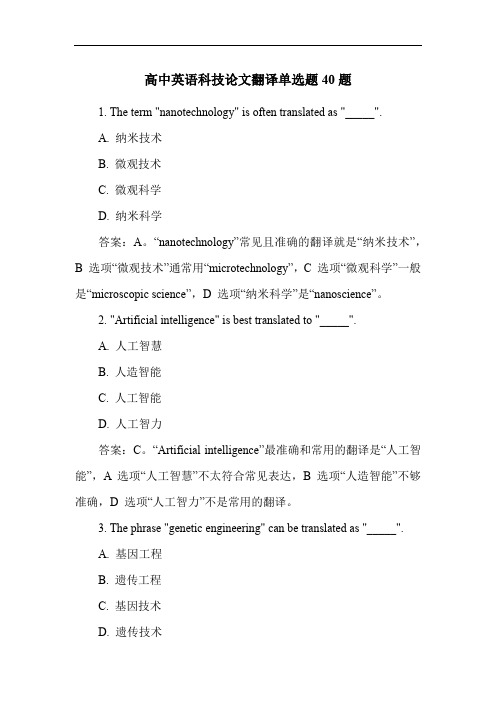
高中英语科技论文翻译单选题40题1. The term "nanotechnology" is often translated as "_____".A. 纳米技术B. 微观技术C. 微观科学D. 纳米科学答案:A。
“nanotechnology”常见且准确的翻译就是“纳米技术”,B 选项“微观技术”通常用“microtechnology”,C 选项“微观科学”一般是“microscopic science”,D 选项“纳米科学”是“nanoscience”。
2. "Artificial intelligence" is best translated to "_____".A. 人工智慧B. 人造智能C. 人工智能D. 人工智力答案:C。
“Artificial intelligence”最准确和常用的翻译是“人工智能”,A 选项“人工智慧”不太符合常见表达,B 选项“人造智能”不够准确,D 选项“人工智力”不是常用的翻译。
3. The phrase "genetic engineering" can be translated as "_____".A. 基因工程B. 遗传工程C. 基因技术D. 遗传技术答案:B。
“genetic engineering”常见的翻译是“遗传工程”,A 选项“基因工程”不太准确,C 选项“基因技术”通常是“genetic technology”,D 选项“遗传技术”一般是“genetic technique”。
4. "Quantum mechanics" is usually translated to "_____".A. 量子力学B. 量子机械学C. 量子物理学D. 量子动力学答案:A。
“Quantum mechanics”准确的翻译是“量子力学”,B 选项“量子机械学”这种表述不常见,C 选项“量子物理学”是“Quantum Physics”,D 选项“量子动力学”是“Quantum Dynamics”。
专业英语翻译练习5:纳米技术.doc
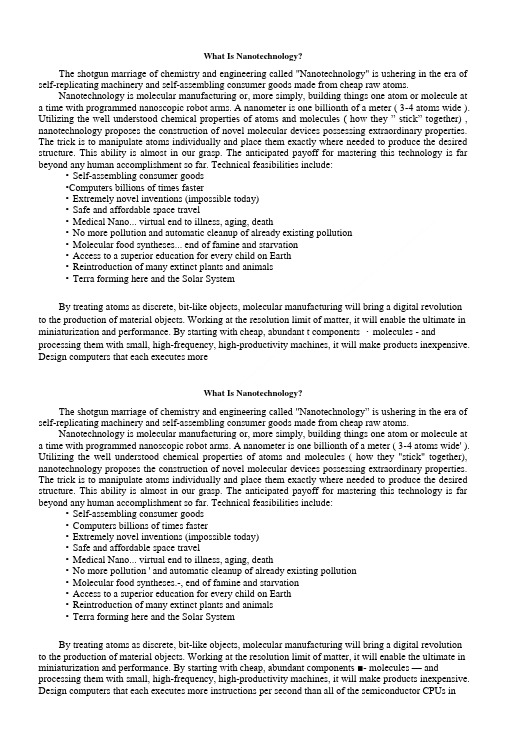
What Is Nanotechnology?The shotgun marriage of chemistry and engineering called "Nanotechnology" is ushering in the era of self-replicating machinery and self-assembling consumer goods made from cheap raw atoms.Nanotechnology is molecular manufacturing or, more simply, building things one atom or molecule at a time with programmed nanoscopic robot arms. A nanometer is one billionth of a meter ( 3-4 atoms wide ). Utilizing the well understood chemical properties of atoms and molecules ( how they ” stick” t ogether) , nanotechnology proposes the construction of novel molecular devices possessing extraordinary properties. The trick is to manipulate atoms individually and place them exactly where needed to produce the desired structure. This ability is almost in our grasp. The anticipated payoff for mastering this technology is far beyond any human accomplishment so far. Technical feasibilities include:•Self-assembling consumer goods•Computers billions of times faster•Extremely novel inventions (impossible today)•Safe and affordable space travel•Medical Nano... virtual end to illness, aging, death•No more pollution and automatic cleanup of already existing pollution•Molecular food syntheses... end of famine and starvation•Access to a superior education for every child on Earth•Reintroduction of many extinct plants and animals•Terra forming here and the Solar SystemBy treating atoms as discrete, bit-like objects, molecular manufacturing will bring a digital revolution to the production of material objects. Working at the resolution limit of matter, it will enable the ultimate in miniaturization and performance. By starting with cheap, abundant t components ・ molecules - and processing them with small, high-frequency, high-productivity machines, it will make products inexpensive. Design computers that each executes moreWhat Is Nanotechnology?The shotgun marriage of chemistry and engineering called "Nanotechnology” is ushering in the era of self-replicating machinery and self-assembling consumer goods made from cheap raw atoms.Nanotechnology is molecular manufacturing or, more simply, building things one atom or molecule at a time with programmed nanoscopic robot arms. A nanometer is one billionth of a meter ( 3-4 atoms wide' ). Utilizing the well understood chemical properties of atoms and molecules ( how they "stick" together), nanotechnology proposes the construction of novel molecular devices possessing extraordinary properties. The trick is to manipulate atoms individually and place them exactly where needed to produce the desired structure. This ability is almost in our grasp. The anticipated payoff for mastering this technology is far beyond any human accomplishment so far. Technical feasibilities include:•Self-assembling consumer goods•Computers billions of times faster•Extremely novel inventions (impossible today)•Safe and affordable space travel•Medical Nano... virtual end to illness, aging, death•No more pollution ' and automatic cleanup of already existing pollution•Molecular food syntheses.-, end of famine and starvation•Access to a superior education for every child on Earth•Reintroduction of many extinct plants and animals•Terra forming here and the Solar SystemBy treating atoms as discrete, bit-like objects, molecular manufacturing will bring a digital revolution to the production of material objects. Working at the resolution limit of matter, it will enable the ultimate in miniaturization and performance. By starting with cheap, abundant components ■- molecules — and processing them with small, high-frequency, high-productivity machines, it will make products inexpensive. Design computers that each executes more instructions per second than all of the semiconductor CPUs inthe world combined. Nanotechnology will reverse the harm done by the industrial revolution. Imagine being able to cure cancer by drinking a medicine stirred into your favorite fruit juice. Imagine a supercomputer no bigger than a human cell. Imagine a four-person, surface-to-orbit spacecraft no larger or more expensive than the family car. These are just a few products expected from nanotechnology.Humanity will be faced with a powerful, accelerated social revolution as a result of nanotechnology. In the near future, a team of scientists will succeed in constructing the first nanosized1 robot capable of self-replication. Within a few short years, and five billion trillion nano-robots later, virtually all present industrial processes will be obsolete as well as our contemporary concept of labor. Consumer goods will become plentiful, inexpensive, smart, and durable. Medicine will take a quantum leap forward. Space travel and colonization will become safe and affordable.For these and other reasons, global life styles will change radically and human behavior will be drastically impacted. The world is on the brink of a new technological revolution beyond any human experience. A new, more powerful industrial revolution capable of bringing wealth, health, and education, without pollution, to every person on the planet. No longer will forest need to be cut or smoke spewed into the air. This is the promise of nanotechnology.A nanometer is one billionth of a meter. That's a thousand, million times smaller than a meter. If you blew up a baseball to the size of the earth, the atoms would become visible, about the size of grapes. Some 3-4 atoms fit lined up inside a nanometer.Nanotechnology is about building things atom by atom, molecule by molecule. The trick is to be able to manipulate atoms individually, and place them where you wish on a structure. Nature uses molecular machines to create life. If you want to see a nanotechnology machine, just look in the mirror. Scientists from several fields including chemistry, biology, physics, and electronics are driving towards the precise manipulation of matter on the atomic scale.How do we get to nanotechnology? Several approaches seem feasible. Ultimately a combination may be the key.悬索桥人们常常愿意修建悬桥以代替其他类型的桥梁,特别是在那些运输量比较小而桥的跨度又大的地方。
小作文纳米技术英语

小作文纳米技术英语Nano technology, a field of science and engineeringthat deals with the manipulation of matter at the atomic and molecular scale, has garnered significant attention and investment in recent years. Its applications span various industries, including medicine, electronics, energy, and materials science. In this essay, we will delve into the advancements, challenges, and future prospects of nanotechnology.Firstly, let's explore the advancements in nanotechnology. One of the remarkable achievements is the development of nanomedicine, where nanoparticles are used for targeted drug delivery, imaging, and therapy. These nanoparticles can be engineered to selectively bind to specific cells or tissues, allowing for precise treatment with minimal side effects. Additionally, nanotechnology has revolutionized the field of electronics through the fabrication of nanoscale transistors and memory devices, enabling faster and more energy-efficient electronicdevices.Moreover, nanotechnology has opened up newpossibilities in renewable energy. Nanostructured materials, such as quantum dots and nanowires, have shown promise in enhancing the efficiency of solar cells and fuel cells. By harnessing the unique properties of nanomaterials, researchers aim to overcome existing limitations in energy conversion and storage technologies.However, along with these advancements come several challenges that need to be addressed. One of the primary concerns is the potential environmental and health risks associated with nanomaterials. Due to their small size and large surface area, nanoparticles may exhibit unique toxicological properties that are not observed in larger particles of the same material. Therefore, it is crucial to thoroughly assess the safety of nanoproducts before their widespread commercialization.Furthermore, the scalability of nanomanufacturing processes remains a significant hurdle. While researchershave demonstrated the fabrication of nanoscale structuresin laboratories, scaling up production to industrial levels without compromising quality and cost-effectiveness is a daunting task. Innovations in nanofabrication techniques, such as nanoimprint lithography and self-assembly, are being pursued to address this challenge.Looking ahead, the future of nanotechnology appears promising with ongoing research efforts and technological advancements. In the field of medicine, nanorobotics holds the potential for precise manipulation and delivery of drugs at the cellular level, paving the way for personalized medicine and targeted cancer therapies. Moreover, the integration of nanoelectronics withbiological systems could lead to the development of advanced prosthetics, neural implants, and brain-computer interfaces, revolutionizing healthcare and human-machine interactions.In conclusion, nanotechnology represents a frontier of scientific exploration with vast potential to transform various aspects of our lives. While significant progresshas been made in harnessing the unique properties of nanomaterials, challenges such as safety, scalability, and ethical considerations persist. By addressing these challenges through interdisciplinary collaboration and responsible innovation, we can unlock the full benefits of nanotechnology and usher in a new era of technological advancement.。
纳米科技英文作文

纳米科技英文作文Nanotechnology is the future. It's all about workingwith materials at the nanoscale, which is really tiny.We're talking about manipulating matter at the molecularand atomic level. It's pretty mind-blowing when you think about it.The potential applications of nanotechnology are endless. We're talking about everything from medicine to electronics to environmental protection. Imagine being able to target cancer cells with nanoscale drug delivery systems, or creating super-efficient solar panels using nanomaterials. The possibilities are truly exciting.One of the most interesting things about nanotechnology is its interdisciplinary nature. It brings together experts from a wide range of fields, including physics, chemistry, biology, and engineering. This collaboration is essentialfor pushing the boundaries of what's possible with nanotechnology.Of course, with great power comes great responsibility. As we continue to develop nanotechnology, we need to be mindful of the potential risks and ethical considerations. We don't want to create new problems while trying to solve existing ones.It's amazing to think about how far we've come with nanotechnology, and it's even more exciting to think about where we're headed. Who knows what the future holds? Maybe one day we'll have nanobots swimming through our bloodstream, repairing damaged cells. The possibilities are truly endless.。
关于纳米技术 这作文
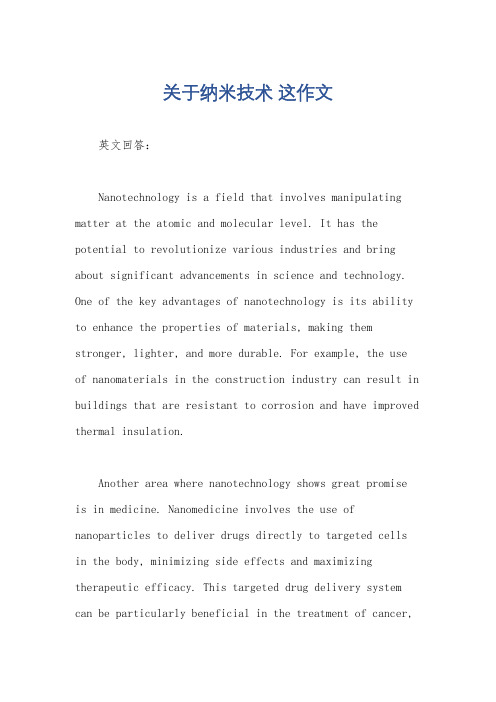
关于纳米技术这作文英文回答:Nanotechnology is a field that involves manipulating matter at the atomic and molecular level. It has the potential to revolutionize various industries and bring about significant advancements in science and technology. One of the key advantages of nanotechnology is its ability to enhance the properties of materials, making them stronger, lighter, and more durable. For example, the use of nanomaterials in the construction industry can result in buildings that are resistant to corrosion and have improved thermal insulation.Another area where nanotechnology shows great promiseis in medicine. Nanomedicine involves the use of nanoparticles to deliver drugs directly to targeted cellsin the body, minimizing side effects and maximizing therapeutic efficacy. This targeted drug delivery system can be particularly beneficial in the treatment of cancer,as it allows for the destruction of cancer cells while sparing healthy ones. Additionally, nanosensors can be used to detect diseases at an early stage, enabling prompt intervention and better treatment outcomes.Furthermore, nanotechnology has the potential to revolutionize the field of electronics. By miniaturizing electronic components, nanotechnology can lead to the development of smaller, faster, and more efficient devices. For instance, nanoscale transistors can be used to create ultra-high-density memory chips, enabling the storage of vast amounts of data in a tiny space. Nanotechnology also has applications in renewable energy, such as the development of more efficient solar cells and batteries with higher energy storage capacities.中文回答:纳米技术是一种涉及到原子和分子级别的物质操控领域。
科普作文 纳米技术英语

科普作文纳米技术英语下载温馨提示:该文档是我店铺精心编制而成,希望大家下载以后,能够帮助大家解决实际的问题。
文档下载后可定制随意修改,请根据实际需要进行相应的调整和使用,谢谢!并且,本店铺为大家提供各种各样类型的实用资料,如教育随笔、日记赏析、句子摘抄、古诗大全、经典美文、话题作文、工作总结、词语解析、文案摘录、其他资料等等,如想了解不同资料格式和写法,敬请关注!Download tips: This document is carefully compiled by theeditor. I hope that after you download them,they can help yousolve practical problems. The document can be customized andmodified after downloading,please adjust and use it according toactual needs, thank you!In addition, our shop provides you with various types ofpractical materials,such as educational essays, diaryappreciation,sentence excerpts,ancient poems,classic articles,topic composition,work summary,word parsing,copyexcerpts,other materials and so on,want to know different data formats andwriting methods,please pay attention!Sure, here's a snippet of a conversational-style English essay on Nanotechnology, without a traditional structure or headings:1. (Randomness 1)。
科技翻译-何为纳米技术?(讲解)
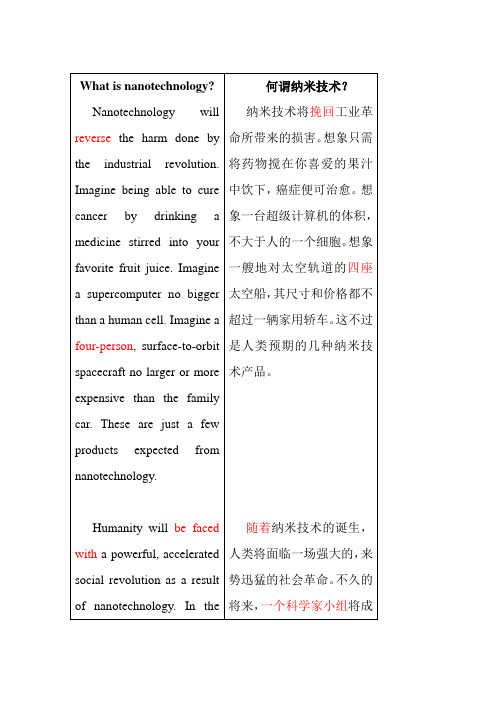
What is nanotechnology?Nanotechnology will reverse the harm done by the industrial revolution. Imagine being able to cure cancer by drinking a medicine stirred into your favorite fruit juice. Imagine a supercomputer no bigger than a human cell. Imagine a four-person, surface-to-orbit spacecraft no larger or more expensive than the family car. These are just a few products expected from nanotechnology.Humanity will be faced with a powerful, accelerated social revolution as a result of nanotechnology. In the何谓纳米技术?纳米技术将挽回工业革命所带来的损害。
想象只需将药物搅在你喜爱的果汁中饮下,癌症便可治愈。
想象一台超级计算机的体积,不大于人的一个细胞。
想象一艘地对太空轨道的四座太空船,其尺寸和价格都不超过一辆家用轿车。
这不过是人类预期的几种纳米技术产品。
随着纳米技术的诞生,人类将面临一场强大的,来势迅猛的社会革命。
不久的将来,一个科学家小组将成near future, a team of scientists will succeed in constructing the first nano-sized robot capable of self-replication. Within a few short years, and five billion trillion nano-robots later, virtually all present industrial processes will be obsolete as well as our contemporary concept of labor. Consumer goods will become plentiful, inexpensive, smart, and durable. Medicine will take a quantum leap forward. Space travel and colonization will become safe and affordable. 功研制出首例能进行自行复制的纳米型机器人。
- 1、下载文档前请自行甄别文档内容的完整性,平台不提供额外的编辑、内容补充、找答案等附加服务。
- 2、"仅部分预览"的文档,不可在线预览部分如存在完整性等问题,可反馈申请退款(可完整预览的文档不适用该条件!)。
- 3、如文档侵犯您的权益,请联系客服反馈,我们会尽快为您处理(人工客服工作时间:9:00-18:30)。
What Is Nanotechnology?The shotgun marriage of chemistry and engineering called "Nanotechnology” is ushering in the era of self-replicating machinery and self-assembling consumer goods made from cheap raw atoms.Nanotechnology is molecular manufacturing or, more simply, building things one atom or molecule at a time with programmed nanoscopic robot arms. A nanometer is one billionth of a meter ( 3-4 atoms wide ). Utilizing the well understood chemical properties of atoms and molecules ( how they M stick'1 together) , nanotechnology proposes the construction of novel molecular devices possessing extraordinary properties. The trick is to manipukite atoms individually and place them exactly where needed to produce the desired structure. This ability is almost in our grasp. The anticipated payoff for mastering this technology is far beyond any human accomplishment so far. Technical feasibilities include:•Self-assembling consumer goods•Computers billions of times faster•Extremely novel inventions (impossible today)•Safe and affordable space travel•Medical Nano... virtual end to illness, aging, death•No more pollution and automatic cleanup of already existing pollution•Molecular food syntheses... end of famine and starvation•Access to a superior education for every child on Earth•Reintroduction of many extinct plants and animals•Terra forming here and the Solar SystemBy treating atoms as discrete, bit-like objects, molecular manufacturing will bring a digital revolution to the production of material objects. Working at the resolution limit of matter, it will enable the ultimate in miniaturization and performance. By starting with cheap, abundant t components - molecules - and processing them with small, high-frequency, high-productivity machines, it will make products inexpensive. Design computers that each executes moreWhat Is Nanotechnology?The shotgun marriage of chemistry and engineering called "Nanotechnology" is ushering in the era of self-replicating machinery and self-assembling consumer goods made from cheap raw atoms.Nanotechnology is molecular manufacturing or, more simply, building things one atom or molecule at a time with programmed nanoscopic robot arms. A nanometer is one billionth of a meter ( 3-4 atoms wide1). Utilizing the well understood chemical properties of atoms and molecules ( how they "stick" together), nanotechnology proposes the construction of novel molecular devices possessing extraordinary properties. The trick is to manipulate atoms individually and place them exactly where needed to produce the desired structure. This ability is almost in our grasp. The anticipated payoff for mastering this technology is far beyond any human accomplishment so far. Technical feasibilities include: •Self-assembling consumer goods•Computers billions of times faster•Extremely novel inventions (impossible today)•Safe and affordable space travel•Medical Nano... virtual end to illness, aging, death•No more pollution ' and automatic cleanup of already existing pollution•Molecular food syntheses... end of famine and starvation•Access to a superior education for every child on Earth•Reintroduction of many extinct plants and animals•Terra forming here and the Solar SystemBy treating atoms as discrete, bit-like objects, molecular manufacturing will bring a digital revolution to the production of material objects. Working at the resolution limit of matter, it will enable the ultimate in miniaturization and performance. By starting with cheap, abundant components ■- molecules ~ and processing them with small, high-frequency, high-productivity machines, it will make products inexpensive. Design computers that each executes more instructions per second than all of the semiconductor CPUs inthe world combined. Nanotechnology will reverse the harm done by the industrial revolution. Imagine being able to cure cancer by drinking a medicine stirred into your favorite fruit juice. Imagine a supercomputer no bigger than a human cell. Imagine a four-person, surface-to-orbit spacecraft no larger or more expensive than the family car. These are just a few products expected from nanotechnology.Humanity will be faced with a powerful, accelerated social revolution as a result of nanotechnology. In the near future, a team of scientists will succeed in constructing the first nanosized1 robot capable of self-replication. Within a few short years, and five billion trillion nano-robots later, virtually all present industrial processes will be obsolete as well as our contemporary concept of labor. Consumer goods will become plentiful, inexpensive, smart, and durable. Medicine will take a quantum leap forward. Space travel and colonization will become safe and affordable.For these and other reasons, global life styles will change radically and human behavior will be drastically impacted. The world is on the brink of a new technological revolution beyond any human experience. A new, more powerful industrial revolution capable of bringing wealth, health, and education, without pollution, to every person on the planet. No longer will forest need to be cut or smoke spewed into the air. This is the promise of nanotechnology.A nanometer is one billionth of a meter. Thafs a thousand, million times smaller than a meter. If you blew up a baseball to the size of the earth, the atoms would become visible, about the size of grapes. Some 3-4 atoms fit lined up inside a nanometer.Nanotechnology is about building things atom by atom, molecule by molecule. The trick is to be able to manipulate atoms individually, and place them where you wish on a structure. Nature uses molecular machines to create life. If you want to see a nanotechnology machine, just look in the mirror. Scientists from several fields including chemistry, biology, physics, and electronics are driving towards the precise manipulation of matter on the atomic scale.How do we get to nanotechnology? Several approaches seem feasible. Ultimately a combination may be the key.悬索桥人们常常愿意修建悬桥以代替其他类型的桥梁,特别是在那些运输量比较小而桥的跨度又大的地方。
